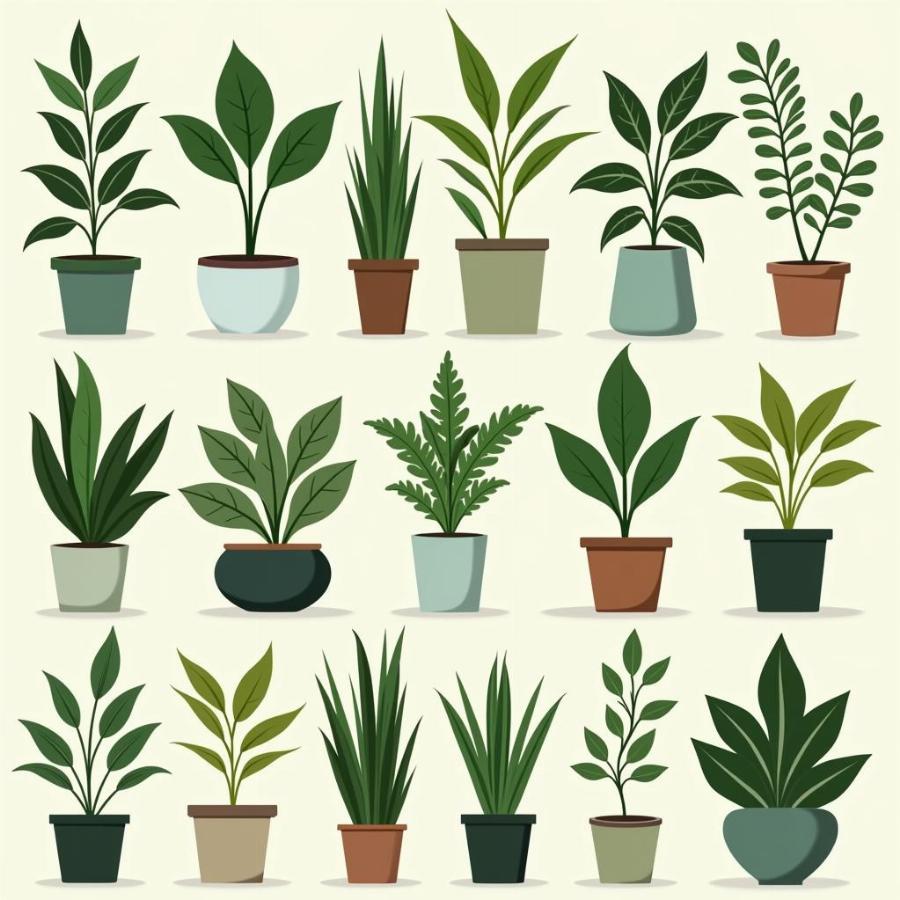Dieffenbachia, also known as dumb cane, is a popular houseplant known for its vibrant foliage. But is dieffenbachia toxic to dogs? The answer is a resounding yes. This seemingly harmless plant poses a real danger to our canine companions. Understanding the risks and taking preventive measures is crucial for responsible dog owners.
The Dangers of Dieffenbachia for Dogs
Dieffenbachia contains insoluble calcium oxalate crystals, which are released when the plant is chewed or bitten. These microscopic crystals cause intense irritation and inflammation in the mouth, throat, and gastrointestinal tract. Symptoms can range from mild discomfort to severe reactions, depending on the amount ingested.
Common signs of dieffenbachia poisoning in dogs include:
- Oral Irritation: Excessive drooling, pawing at the mouth, and vocalization due to pain.
- Swelling: Noticeable swelling of the mouth, tongue, and throat can make breathing difficult.
- Vomiting: Ingestion of dieffenbachia often leads to vomiting.
- Difficulty Swallowing: The inflammation caused by the crystals can make it painful or impossible for your dog to swallow.
What to Do If Your Dog Eats Dieffenbachia
If you suspect your dog has ingested dieffenbachia, immediate action is crucial.
- Remove the plant: Take the dieffenbachia away from your dog’s reach.
- Rinse your dog’s mouth: If possible, gently flush your dog’s mouth with water to help remove the crystals.
- Contact your veterinarian: Describe the situation and your dog’s symptoms to your vet. They will advise you on the best course of action, which may include inducing vomiting or providing supportive care.
- Monitor your dog: Keep a close eye on your dog for any worsening symptoms, such as difficulty breathing or excessive swelling.
Preventing Dieffenbachia Poisoning in Dogs
Prevention is always better than cure. Here are some tips to keep your furry friend safe:
- Keep dieffenbachia out of reach: Place the plant in a location inaccessible to your dog, such as a high shelf or hanging basket.
- Train your dog: Teach your dog a strong “leave it” command to deter them from investigating plants.
- Provide alternative chewing options: Offer safe and appropriate chew toys to keep your dog occupied and away from houseplants.
- Supervise your dog: When indoors, supervise your dog closely, especially if they are prone to chewing on things.
Are other houseplants toxic to my dog?
Yes, many common houseplants are toxic to dogs. It’s crucial to research any plants you bring into your home to ensure they’re safe for your furry companions. Some other toxic plants to watch out for include peace lilies, philodendrons, and sago palms. peace lily plant harmful to dogs can cause similar symptoms to dieffenbachia, while large indoor plants safe for dogs can provide a safe and beautiful alternative for your home.
 Various dog-safe indoor plants.
Various dog-safe indoor plants.
Expert Insights
“Dieffenbachia poisoning can be a serious concern for dog owners,” says Dr. Jane Miller, DVM. “Prompt veterinary attention is essential for managing the symptoms and preventing complications.”
Conclusion
Is dieffenbachia toxic to dogs? Absolutely. Protecting your dog from this common household hazard requires awareness, proactive measures, and a commitment to creating a safe environment. By understanding the risks and taking appropriate precautions, you can ensure your canine companion remains healthy and happy. Remember to always consult with your veterinarian if you have any concerns about your dog’s health or potential exposure to toxic substances. It’s always better to be safe than sorry when it comes to your furry friend’s well-being.
FAQ
-
What are the first signs of dieffenbachia poisoning in dogs? Excessive drooling, pawing at the mouth, and swelling are usually the first signs.
-
Can dieffenbachia be fatal to dogs? While rare, severe cases can lead to breathing difficulties and complications that could be life-threatening.
-
What should I do if my dog only nibbled on a dieffenbachia leaf? Even a small amount can cause irritation, so contact your veterinarian for advice.
-
Are there any home remedies for dieffenbachia poisoning in dogs? No, it’s crucial to seek professional veterinary care immediately.
-
Are all varieties of dieffenbachia toxic to dogs? Yes, all varieties of dieffenbachia contain calcium oxalate crystals and are toxic to dogs.
-
How can I make my home a safe space for my dog and plants? Choose dog-safe plants and place potentially toxic ones out of your dog’s reach.
-
What are some safe alternatives to dieffenbachia for dog owners? Consider pet-friendly options like spider plants, areca palms, or bamboo. jamaican dog blood bush could also be a colorful and safe alternative.
Beaut Dogs is your trusted source for comprehensive information on dog care, breed guides, and expert advice. For personalized guidance on ensuring your dog’s safety and well-being, including information on toxic plants and creating a pet-friendly home, contact us at Email: [email protected]. Beaut Dogs is committed to providing you with accurate and practical information to help you navigate the joys and responsibilities of dog ownership. Visit us at https://beautdogs.com.